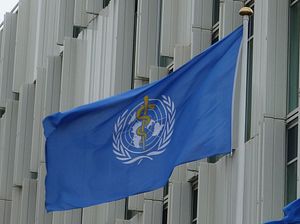United States Secretary of State Mike Pompeo on Wednesday publicly backed Taiwan’s participation in this month’s World Health Assembly (WHA) as an observer, calling on WHO Director-General Tedros Adhanom Ghebreyesus to invite the country to the upcoming assembly.
It’s the latest step in a U.S. campaign in both diplomatic and public-facing channels that has seen diplomats seek support from European allies and other democratic states for Taiwan’s inclusion in the WHA, part of a struggle for influence in the WHO between Washington and Beijing.
“Today I want to call upon all nations, including those in Europe, to support Taiwan’s participation as an observer at the World Health Assembly and in other relevant United Nations venues,” Pompeo said at a White House news briefing.
“I also call upon WHO Director-General Tedros to invite Taiwan to observe this month’s WHA, as he has the power to do, and as his predecessors have done on multiple occasions.”
WHO legal officers have said at news briefings this week Taiwan’s attendance at the conference, which will be held virtually beginning May 18, is up to the WHO’s 194 member states. Past WHO heads have said they have the discretion to extend invitations to attend the WHA as an observer, but Tedros has declined to comment on whether he retains that power.
Taiwan participated in the WHA as an observer from 2009 to 2016, when the Beijing-friendly President Ma Ying-jeou was in office. It has not been invited since President Tsai Ing-wen took office on May 20, 2016.
Although Taiwan has protested its exclusion from the WHA in the years since Tsai’s election, it has garnered strong support from the United States and allied nations due to its successful handling of the COVID-19 pandemic. Taiwan has reported 440 total cases and has not reported any locally transmitted cases since April 12. The country has closed its borders to nonresidents and banned mass gatherings, but it has otherwise not had to implement quarantines or close businesses and schools.
In his Wednesday remarks, Pompeo said China is “still refusing to share the information we need to keep people safe.” He backed off earlier statements suggesting that the coronavirus originated in a lab in Wuhan, saying “we don’t have certainty” but adding “there is significant evidence that this came from the laboratory. Those statements can both be true. I’ve made them both.”
U.S. military and Five Eyes intelligence officials have said there is no evidence showing the coronavirus leaked from a lab. But they do concur that the Chinese government has not been forthcoming in sharing information, and Taiwan – both transparent and successful in containing the virus by contrast – has been cast as a wedge as Washington and Beijing grapple for influence in world organizations.
Australia and New Zealand have joined the United States in pushing for Taiwan’s observer status. “They have got something to teach the rest of the world, and every country including China must surely want to know the secret of the success,” New Zealand Foreign Minister Winston Peters said Thursday.
Apart from its diplomatic maneuvering, the U.S. State Department launched a “#TweetforTaiwan” campaign last week. “Before 2017, Beijing didn’t object to Taiwan joining the World Health Assembly as an Observer. What’s changed?” the department wrote in one tweet.
The answer is Tsai, who sees greater distance between Taipei and Beijing as crucial to protecting Taiwan’s sovereignty. This has led the Chinese government to limit Taiwan’s international space and brand Tsai and her Democratic Progressive Party (DPP) as separatists backing Taiwan’s formal independence, a goal Tsai has never said she favors. (After her January reelection, Tsai said Taiwan is “already independent” and has no need for a formal declaration.)
The State Department retweeted Tsai’s tweet about Taiwan’s success in combating the virus, writing: “@iingwen, the contrast with the #PRC is striking. China’s response to the outbreak of #COVID19 has been to hide the facts, muzzle its scientists and censor discussion.”
The Chinese mission to the UN in Geneva called the Twitter campaign “another political trick,” tweeting: “Strongly oppose using this question to interfere in China’s internal affairs. Trying to shift the blame for inadequate response to #COVID19 in US? No way.”
Taiwan’s foreign ministry, meanwhile, thanked the United States for its “creative” online campaign.
As the pandemic has spread around the world, Taiwan has donated supplies and hosted online briefings and videoconferences with doctors and health officials in other countries. Last week, the foreign ministry launched an English-language press portal documenting “the Taiwan model for combating COVID-19.”
Taiwan said Tuesday it would donate 7 million surgical face masks to countries around the world, its third round of donations in the past month.

































